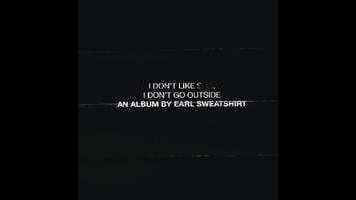Earl Sweatshirt does more with less on I Don’t Like Shit, I Don’t Go Outside

In 2013 it seemed as if just about the only person not buying into the Earl Sweatshirt myth was Earl himself. The prodigal young rapper had just reemerged from his mysterious disappearance—turns out he’d been sent to a school for at-risk boys in Samoa—and the music press was eagerly scouring his every verse, appearance, and casual comment for clues into what shape his first official album might take. They anticipated nothing short of a masterpiece, and Earl responded with, well, something less than one. Closed off and uneager to impress, his commercial debut Doris refused listeners not only the cheap thrills of his breakthrough mixtape Earl, but also such basic trappings as hooks and choruses. Though Earl penned some typically sharp verses, his somnambulistic flow made no effort to sell them.
Doris made it clear that Earl’s not the kind of artist who’s going to outdo himself with a Paul McCartney and Rihanna feature, and his follow-up I Don’t Like Shit, I Don’t Go Outside only pushes that album’s muted, beats-and-rhymes aesthetic to even further insular extremes. At just under a half hour, it’s even more understated than its predecessor, with fewer guests, almost no outside producers, less variety—less everything, really. That may sound like a downgrade, but it’s not, since here the anti-spectacle becomes a kind of spectacle of its own, as Earl tests how far his music can retreat into itself. The lonely chords and curt drums of “Mantra” echo as if recorded in an abandoned warehouse. “Grief” is all broken tones, shrill and mistreated, a disquieting backdrop for Earl’s depressive accounts of loss and retreat. It’s gloomy stuff, yet there’s a mischievous wit underneath it all, a different manifestation of the same audacity that bore Earl’s rebellious early raps.
As on Doris, one of the strongest verses belongs not to Earl but rather to his longtime collaborator Vince Staples, who dazzles in the leadoff spot on closer “Wool.” It’s easy to see why the two record together so often. They’re complimentary opposites, with Staples’ alert charisma cutting sharply against Earl’s muttered prose. Last year, after years of playing second fiddle to Earl and his Odd Future cohorts, Staples rose to critical prominence with a pair of excellent releases, the Shyne Coldchain Vol. 2 mixtape and the Hell Can Wait EP. He’s beginning to feel like the star that Earl was supposed to be, and to hear the two play off each other on “Wool,” they’re both fine with that new arrangement. Staples is claiming the spotlight Earl never wanted, while Earl sounds more comfortable than ever in the shadows.